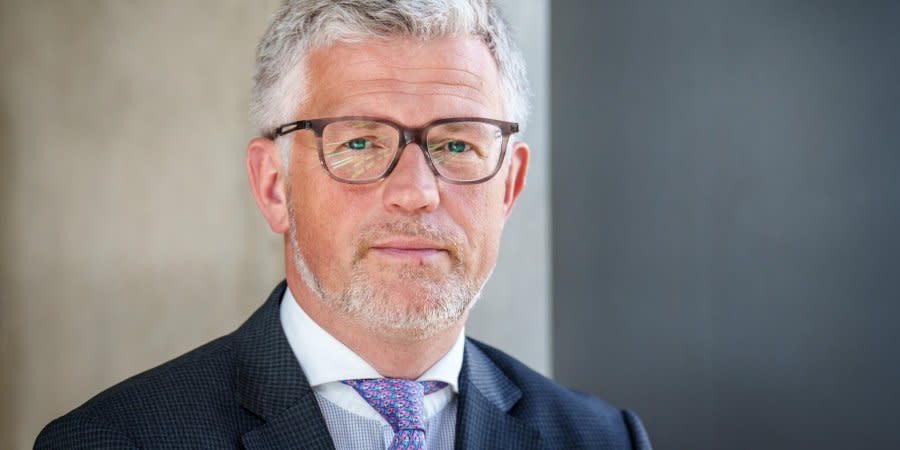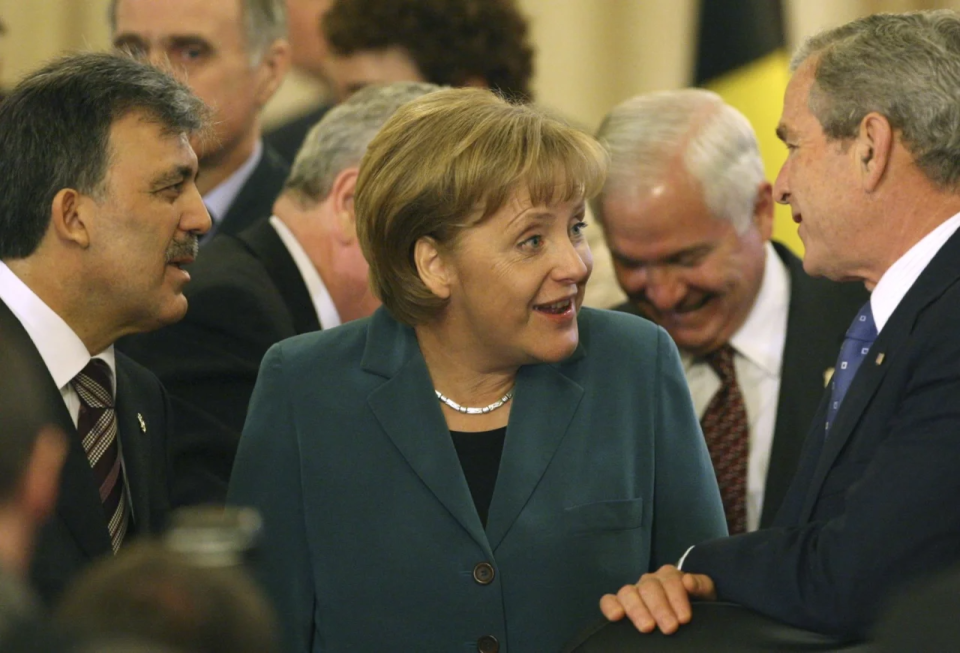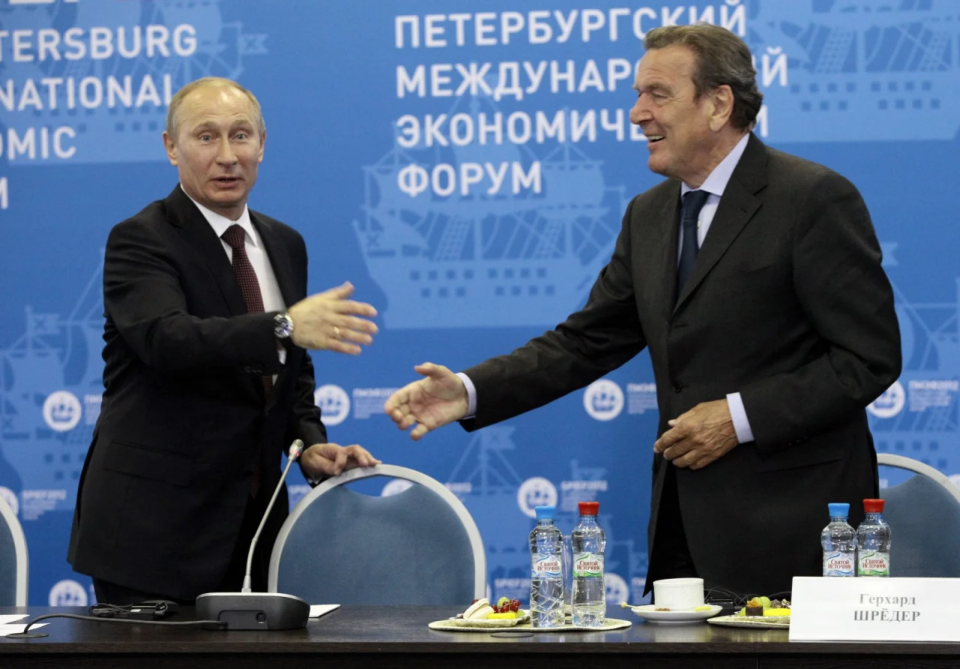Ambassador Melnyk on why Berlin is so reluctant to free itself from Russian dependence

- Oops!Something went wrong.Please try again later.
- Oops!Something went wrong.Please try again later.
One of the most outspoken critics of German Chancellor Olaf Scholz and his government, Melnyk elaborated on the economic aspects of Berlin's loyalty to Moscow in an interview with NV.
NV: Berlin and Moscow have been "friends" for a long time — at least since the time of Chancellor Gerhard Schroeder. By the way, his successor in this position, Angela Merkel, refuses to admit her guilt in making Germany dependent on Russian gas.
Melnyk: We have not heard a single word that this was not the right course or even more so a mistake. But it's in the pipeline.
Read also: Transfer of Greek BMP-1s to Ukraine contingent on Germany
NV: Merkel recently gave a long interview with German journalists.
Melnyk: Yes, I learned that my acquaintance, a German journalist, would be interviewing her, and I congratulated him on convincing the ex-chancellor. He replied: "Give me a list of questions to ask her — if you want, even three." I sent him four.
And he actually asked them, these questions were the most inconvenient — and subsequently made headlines. It was a question of whether Ms. Merkel felt guilty and responsible for the policy of appeasement towards Putin, which many Ukrainians thought was one of the main reasons for Russia's aggression.
Plus, there was the issue of Ms. Merkel's role in the 2008 Bucharest Summit. As we know, she was the leader of NATO member states who strongly opposed granting Ukraine membership in the Alliance. Thus, it left Ukraine in the gray zone in which we have been for the last 14 years.
Interestingly, in both cases, Ms. Merkel did not justify her choices, she even outright rejected the possibility of admitting any mistakes.
And today we have criticized her reaction again. Germany's policy on the [Russian gas pipeline] Nord Stream, NATO, pacifying Putin, failing to provide Ukraine with weapons, etc. seems consistent, but for some reason, Russia — out of the blue — decided to attack Ukraine. My argument in the German public space is that the policy towards Russia must be critically revised so that such failures and catastrophes do not happen again in the future.

It is important for the Germans themselves to understand how it turned out that they were told for years that Nord Stream did not increase Germany's dependence on Russia in terms of energy. In addition, their entire energy policy was aimed at Russia — as if this did not pose any danger.
Today, we see that even if the German government wants to propose a moratorium or a full embargo not only on oil — but also on gas in the first place — they cannot do so. They are hostages to this policy at best. In fact, Germany has become an energy vassal of Russia, because this country is not able to make any decisions to stop funding the Kremlin's military aggression against Ukraine.
Because if it stops buying gas, its government says they will not only have to put on coats in their homes, but entire sectors of the economy will almost disappear. There will be millions of people unemployed, there will be a huge recession. Then Germany will allegedly not be able to continue to help Ukraine fight the war. Germans love such rhetoric.
Although, there are a number of independent studies suggesting that giving up gas will not be so catastrophic for Germany.
Read also: Germany hesitant to supply tanks to Ukraine over fears it might invade Russia – Bild
This situation is gradually changing today. We must give credit to the Minister of Economy of Germany, Robert Habeck, who travels around the world, to Arab countries (Qatar and others) and is looking for opportunities to purchase both oil and liquefied natural gas. Including from the United States.
Minister [of Community Development] Oleksiy Chernyshov and I spoke with the leadership of the German economy. To the direct question: “What about the gas embargo? When can we expect it?” it was said that Germany would not be able to stop buying Russian gas before the end of 2024.
NV: They began to build terminals for liquefied gas.
Melnyk: According to the latest information from the German government, the first such terminals, in which they are now actively investing, will appear no earlier than the first half of 2023. And it will be gas that will come from the United States, partly from Qatar and other countries.
Therefore, it is a trap into which a number of previous governments, not just the one headed by Ms. Merkel, have led Germany themselves, and deprived it of any geopolitical maneuvering space. It is important to improve on mistakes, but no one does. In addition, there are still those in power who led to this situation.
NV: Who among German politicians is lobbying for this position now?
Melnyk: Now nobody. On the contrary, the position is to quickly get rid of this dependence. But it is not a question of the EU and Germany stopping energy purchases at once. That is why there is no politician, not even the Social Democrats, the far-right or the left, who does not want to get rid of this dependence.
Almost everyone says that when the war is over, Germany wants to stop buying energy forever. That is, all these Nord Streams - 1, 2 must be buried at the bottom of the Baltic Sea. But the question is that everyone is a hostage. That is why, for instance, Habeck, with whom there is a fairly trusting contact, admits that "we can't jump over our heads" if we want to, because the previous government put them in such a miserable situation.
NV: As for former Chancellor Gerhard Schroeder, he was not even expelled from the Social Democratic Party, although he works with Russia's state-owned energy companies. Why did this happen?
Melnyk: As for him, there are many factors in play. In recent weeks, we have seen that both the party leadership and many ordinary members have openly called on him to leave the party. This did not happen, first of all, because the process of expulsion from the party is very slow, democratic, and complicated. That is why Mr. Schroeder is a member of the party. But all those who until recently gave him political support distanced themselves from him.
Now he has no allies left, so just the threat of sanctions forced him to resign from Gazprom.
Mr. Schroeder is a litmus test of how difficult it is for Germany to say goodbye to the Russian gas, oil, energy, and lobbying past.
He excluded himself from this political track. He does not appear in the media. But he remains convinced that what he did was right. It is alleged that his contacts with Putin were in Germany's interests and allowed the German economy to become so strong. And this is also due to cheap energy carriers and other resources that Germany received from Russia.

Schroeder gave a single interview to The New York Times. The journalist who interviewed him told me that she was just shocked that he didn't feel guilty in the slightest. He said he was not going to say it was his fault because it was not his style. He believes that he did everything right. And in fact he acted under the pressure of circumstances that he could not resist.
NV: It is good that relations with Russia have become toxic.
Melnyk: They have become toxic at the political level in terms of the cessation of trade and investment. This process is still somewhere in the middle because many companies under our pressure and independently decided to halt or suspend their activities in Russia. But many businesses continue to operate in Russia.
The likes of Metro. The head of this company sent a letter to our Minister [of Foreign Affairs] Dmytro Kuleba stating that "we understand and condemn (the invasion), but we do not plan to leave the Russian market." And there are hundreds of such companies. I gave a long interview to the main [German] economic magazine, where one of the arguments was: "It was a purely moral obligation to be or not to be in Russia (to do business with German companies) during the Kremlin's aggressive war against Ukraine. Should we still make a decision and leave the market?”
I appealed to German companies to suspend all contacts (with Russia) Even those not banned by the current EU sanctions are to show the Russian leadership that it is not just governments that are willing to bear the brunt of these sanctions.
This process is very complicated because there are a lot of arguments about "why we can't do it", "but there are jobs, we are worried about our Russian employees, they are absolutely against Putin." That is, they are still looking for excuses, saying that these are only pharmaceutical companies, we provide humanitarian needs so that people do not die without drugs and the like. But we appeal to businessmen as people of goodwill: at this time it is in bad taste to continue doing business with Russia. Whether we will succeed — time will tell.
NV: And what does Germany want at the federal level?
Melnyk: If you ask a Ukrainian politician, or public figure, or expert: "What are the national interests of Ukraine?” Most will say: join the EU, become a member of NATO. These things are obvious, we are talking about them. Ask any of the visiting German diplomats and politicians: what is Germany's national interest?
And no one will tell you. General things will be named: to strengthen liberalism, order, human rights. Anything, but not really necessary things. The Germans do not dare to voice really important topics. They are only approaching this.
Read also: Germany to halt Nord Stream-2 certification in response to further Russian invasion of Ukraine
NV: Are they also undergoing a transformation in society?
Melnyk: Yes. They do not know what will happen next, and how it will affect them. They see the consequences of the war for the German consumer, the driver of a car that pays twice as much for petrol as last year. They see inflation, which is more or less 7-8%, but this is the highest inflation in more than 40 years.
The Germans felt all these things during the 105 days of the war. They understand that this is just the beginning. Society is psychologically traumatized. So they want to know what to do next to improve the situation. But they have no answer. Because on the one hand they express solidarity with the country, and the government, and on the other hand the question arises: what is the purpose of the war?
Maybe restore the status quo before February 24? And this is more or less clear when we say that our goal is to restore our integrity, our sovereignty, including Crimea and Donbas. This begs the question: what does this mean for Germany? This is financial, humanitarian and weapons support. All this must continue for a long time. And neither political elites nor ordinary Germans are ready for this. They want this nightmare to end.
NV: There is a concept that Western countries are afraid of strengthening Ukraine, they claim, there will arise a very powerful player in Eastern Europe. How does this correlate with reality?
Melnyk: Of course, no one voices this idea here. It is kept on the low. The Germans see this mainstream [notion] that thanks to the resilience [psychological resilience, stress resilience] of Ukrainian society, government, and the army, they managed to effectively contain the world’s second largest army. And the cult of President Zelensky, the cult of heroic resistance of the people — on the one hand it is a real delight.
Read also: High noon for the West. Above all, for Germany
On the other hand, there is what you said. It is not envy that arises, but the reluctance to be just an ordinary nation. Especially since it helped the aggressor until recently and now sends hundreds of thousands of euros there every day for energy.
And so there is a mental skirmish, and the Germans are uncomfortable in this role. They try to compensate for this by finding other points for which we cannot be criticized, to formulate new goals. For example, to save the world from hunger. Today, this topic is almost mainstream. Therefore, if there is a need to force us to compromise, the Germans will say that they have a noble goal — to save the world from starvation.
Read also: German chancellor says any sanctions against Russia will affect Germany’s economy
But there are fears in case Ukraine really does join, if it will push for its accession more actively. Now the candidate status, then the negotiations. The balance of power within the EU itself may change. This is treated quite differently in Germany and in the countries of Old Europe (France, Italy) than in Poland or the Baltics. Therefore, this factor does play a role, but it is not mentioned anywhere.
This means that the EU is not authentic nowadays. Serious domestic reforms are overdue. First of all, on the abolition of the principle of unanimity, as is shown with the example of the sixth package of sanctions. Everyone understands that if the EU expands into the Western Balkans, Ukraine will join, maybe Moldova, Georgia, then there will be no longer 27 member states — and there will be a completely different distribution of votes. Ukraine will have a fairly strong voice there, not only in the European Parliament, but in Europe generally.

